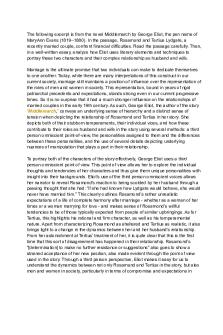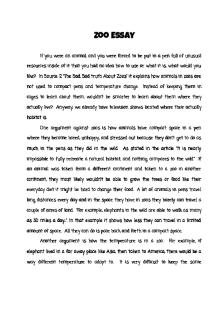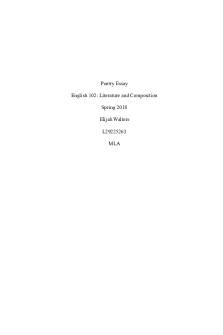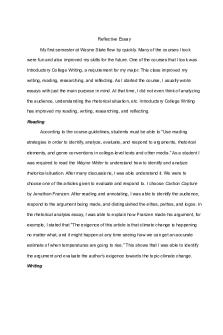Practice essay - Grade: B PDF

| Title | Practice essay - Grade: B |
|---|---|
| Course | 20th Century American Literature and English |
| Institution | Stony Brook University |
| Pages | 2 |
| File Size | 58.6 KB |
| File Type | |
| Total Downloads | 4 |
| Total Views | 169 |
Summary
Essays was on MiddleMarch...
Description
The following excerpt is from the novel Middlemarch by George Eliot, the pen name of MaryAnn Evans (1819–1880). In the passage, Rosamond and Tertius Lydgate, a recently married couple, confront financial difficulties. Read the passage carefully. Then, in a well-written essay, analyze how Eliot uses literary elements and techniques to portray these two characters and their complex relationship as husband and wife. Marriage is the ultimate promise that two individuals can make to dedicate themselves to one another. Today, while there are many interpretations of this construct in our current society, marriage still maintains a position of influence over the representation of the roles of men and women in society. This representation, bound in years of rigid patriarchal precedents and expectations, stands strong even in our current progressive times. So it is no surprise that it had a much stronger influence on the relationships of married couples in the early 19th century. As such, George Eliot, the author of the story “Middlemarch,” conveys an underlying sense of hierarchy and a distinct sense of tension when depicting the relationship of Rosamond and Tertius in her story. She depicts both of their stubborn temperaments, their individual vices, and how these contribute to their roles as husband and wife in the story using several methods: a third person omniscient point-of-view, the personalities assigned to them and the differences between these personalities, and the use of several details depicting underlying nuances of manipulation that plays a part in their relationship. To portray both of the characters of the story effectively, George Eliot uses a third person omniscient point of view. This point of view allows her to explore the individual thoughts and tendencies of her characters and thus give them unique personalities with insight into their backgrounds. Eliot’s use of the third person omniscient voices allows her narrator to reveal Rosamond’s reaction to being scolded by her husband through a passing thought that she had: “if she had known how Lydgate would behave, she would never have married him.” This clearly outlines Rosamond’s rather unrealistic expectations of a life of complete harmony after marriage - whether as a woman of her times or a woman marrying for love - and makes sense of Rosamond’s willful tendencies to be of those typically expected from people of similar upbringings. As for Tertius, this highlights his rational and firm character, as well as his temperamental nature. Apart from characterizing Rosamond as sheltered and Tertius as realistic, it also brings light to a change in the dynamics between her and her husband’s relationship. From her astonishment at Tertius’ treatment of her, it is quite clear that this is the first time that this sort of disagreement has happened in their relationship. Rosamond’s “[determination] to make no further resistance or suggestions” also goes to show a strained acceptance of her new position, also made evident through the point of view used in the story. Through a third person perspective, Eliot makes it easy for us to understand the dynamics between not only Rosamund and Tertius in the story, but also men and women in society, particularly in terms of compromise and expectations in
which women tend to sacrifice for both. As determined from her characterization, we can see that Rosamond comes from a relatively affluent background as it allowed her to “[know] nothing but indulgence and [dream only] of new indulgence.” In contrast to this, Tertius’ main characteristic is his rationale, likely due to his profession of being a businessman. It is clear to understand in this case how Eliot may use this contrast in their characters to, in a way, juxtapose the concepts of heart, or desire, and mind, or logic, in her writing - again overlapping societal stereotypes of her time. She even highlights this contrast with a shared quality of theirs - their stubbornness. We can also see the contrasts in their characters by means of their actions. Rosamond’s methods of persuasion tend to lean toward the pitiful, wayward sort and does not extend beyond that, whereas Tertius’ methods may exceed that and simply utilize temper in order to manipulate things to his wish. The differences in their approaches can be seen throughout the text. Such as, the change in the way Tertius calls Rosamond’s name whilst trying to persuade her, starting from calling her pet names like “Rosy” or “darling” when still attempting to console and persuade her to cooperate willingly to calling her by her full name - “Rosamond” - thus exerting dominance in a way that relays explicit manipulation. Rosamond, to achieve the same effect, tries to appeal to Tertius’ emotions instead, endearing herself to him after weeping and insisting on having her way. Again, this depicts a reality for many women of Eliot’s time as well as for many women today. In hindsight, the relationship between these two characters in Eliot’s story established by a third person omniscient point of view, clear characterization, and certain nuances in the behaviors of the characters seem like a clear reflection of the experiences and roles of real people in those times. Considering the comparatively increased insight into the mind of a woman in the story - Rosamond’s to be exact - we may determine that these thoughts are a reflection of Eliot’s impressions....
Similar Free PDFs

Practice essay - Grade: B
- 2 Pages

Rogerian Essay - Grade: B
- 2 Pages

Zoo Essay - Grade: B+
- 2 Pages

Causation Essay - Grade: B
- 4 Pages

Final Essay - Grade: B+
- 12 Pages

Propaganda Essay - Grade: b
- 4 Pages

Poetry Essay - Grade: B
- 5 Pages

Galileo Essay - Grade: B+
- 6 Pages

Fiction Essay - Grade: B
- 7 Pages

EPQ Essay - Grade: B+
- 10 Pages

Law essay - Grade: B
- 9 Pages

Persuasive Essay - Grade: B
- 3 Pages

Evicted Essay - Grade: B+
- 3 Pages

Charities essay - Grade: B+
- 13 Pages

Reflective Essay - Grade: B
- 4 Pages

Analysis essay - Grade: B+
- 3 Pages
Popular Institutions
- Tinajero National High School - Annex
- Politeknik Caltex Riau
- Yokohama City University
- SGT University
- University of Al-Qadisiyah
- Divine Word College of Vigan
- Techniek College Rotterdam
- Universidade de Santiago
- Universiti Teknologi MARA Cawangan Johor Kampus Pasir Gudang
- Poltekkes Kemenkes Yogyakarta
- Baguio City National High School
- Colegio san marcos
- preparatoria uno
- Centro de Bachillerato Tecnológico Industrial y de Servicios No. 107
- Dalian Maritime University
- Quang Trung Secondary School
- Colegio Tecnológico en Informática
- Corporación Regional de Educación Superior
- Grupo CEDVA
- Dar Al Uloom University
- Centro de Estudios Preuniversitarios de la Universidad Nacional de Ingeniería
- 上智大学
- Aakash International School, Nuna Majara
- San Felipe Neri Catholic School
- Kang Chiao International School - New Taipei City
- Misamis Occidental National High School
- Institución Educativa Escuela Normal Juan Ladrilleros
- Kolehiyo ng Pantukan
- Batanes State College
- Instituto Continental
- Sekolah Menengah Kejuruan Kesehatan Kaltara (Tarakan)
- Colegio de La Inmaculada Concepcion - Cebu